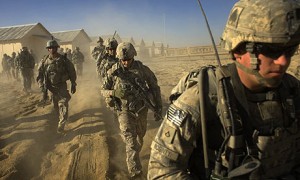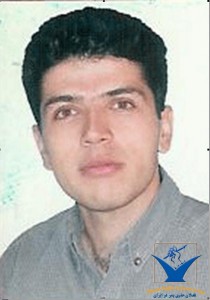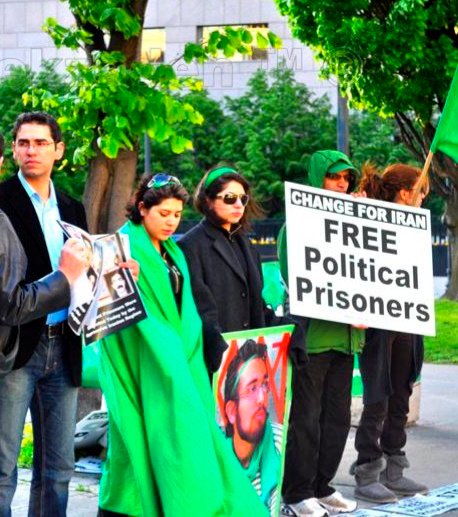Friday
May212010
Afghanistan & Pakistan Analysis: Obama on a Road to Ruin? (Englehardt)
 Friday, May 21, 2010 at 2:00
Friday, May 21, 2010 at 2:00  Tom Englehardt writes for TomDispatch:
Tom Englehardt writes for TomDispatch:On stage, it would be farce. In Afghanistan and Pakistan, it’s bound to play out as tragedy.
Less than two months ago, Barack Obama flew into Afghanistan for six hours -- essentially to read the riot act to Afghan President Hamid Karzai, whom his ambassador had only months before termed “not an adequate strategic partner.” Chairman of the Joint Chiefs Admiral Mike Mullen followed within a day to deliver his own “stern message.”
Afghanistan-Pakistan Revealed: America’s Private Spies
While still on Air Force One, National Security Adviser James Jones offered reporters a version of the tough talk Obama was bringing with him. Karzai would later see one of Jones’s comments and find it insulting. Brought to his attention as well would be a newspaper article that quoted an anonymous senior U.S. military official as saying of his half-brother, Ahmed Wali Karzai, a reputedly corrupt powerbroker in the southern city of Kandahar: “I'd like him out of there... But there's nothing that we can do unless we can link him to the insurgency, then we can put him on the [target list] and capture and kill him." This was tough talk indeed.
At the time, the media repeatedly pointed out that President Obama, unlike his predecessor, had consciously developed a standoffish relationship with Karzai. Meanwhile, both named and anonymous officials regularly castigated the Afghan president in the press for stealing an election and running a hopelessly corrupt, inefficient government that had little power outside Kabul, the capital. A previously planned Karzai visit to Washington was soon put on hold to emphasize the toughness of the new approach.
The administration was clearly intent on fighting a better version of the Afghan war with a new commander, a new plan of action, and a well-tamed Afghan president, a client head of state who would finally accept his lesser place in the greater scheme of things. A little blunt talk, some necessary threats, and the big stick of American power and money were sure to do the trick.
Meanwhile, across the border in Pakistan, the administration was in an all-carrots mood when it came to the local military and civilian leadership --- billions of dollars of carrots, in fact. Our top military and civilian officials had all but taken up residence in Islamabad. By March, for instance, Admiral Mullen had already visited the country 15 times and U.S. dollars (and promises of more) were flowing in. Meanwhile, U.S. Special Operations Forces were arriving in the country’s wild borderlands to train the Pakistani Frontier Corps and the skies were filling with CIA-directed unmanned aerial vehicles pounding those same borderlands, where the Pakistani Taliban, al-Qaeda, and other insurgent groups involved in the Afghan War were located.
In Pakistan, it was said, a crucial “strategic relationship” was being carefully cultivated. As The New York Times reported, “In March, [the Obama administration] held a high-level strategic dialogue with Pakistan’s government, which officials said went a long way toward building up trust between the two sides.” Trust indeed.
Skip ahead to mid-May and somehow, like so many stealthy insurgents, the carrots and sticks had crossed the poorly marked, porous border between Afghanistan and Pakistan heading in opposite directions. Last week, Karzai was in Washington being given “the red carpet treatment” as part of what was termed an Obama administration “charm offensive” and a “four-day love fest.”
The president set aside a rare stretch of hours to entertain Karzai and the planeload of ministers he brought with him. At a joint news conference, Obama insisted that “perceived tensions” between the two men had been “overstated.” Specific orders went out from the White House to curb public criticism of the Afghan president and give him “more public respect” as “the chief U.S. partner in the war effort.”
Secretary of State Hillary Clinton assured Karzai of Washington’s long-term “commitment” to his country, as did Obama and Afghan War commander General Stanley McChrystal. Praise was the order of the day.
John Kerry, chairman of the Senate Foreign Relations Committee, interrupted a financial reform debate to invite Karzai onto the Senate floor where he was mobbed by senators eager to shake his hand (an honor not bestowed on a head of state since 1967). He was once again our man in Kabul. It was a stunning turnaround: a president almost without power in his own country had somehow tamed the commander-in-chief of the globe’s lone superpower.
Meanwhile, Clinton, who had shepherded the Afghan president on a walk through a “private enclave” in Georgetown and hosted a “glittering reception” for him, appeared on CBS’s “60 Minutes” to flay Pakistan. In the wake of an inept failed car bombing in Times Square, she had this stern message to send to the Pakistani leadership: "We want more, we expect more... We've made it very clear that if, heaven forbid, an attack like this that we can trace back to Pakistan were to have been successful, there would be very severe consequences." Such consequences would evidently include a halt to the flow of U.S. aid to a country in economically disastrous shape. She also accused at least some Pakistani officials of “practically harboring” Osama bin Laden. So much for the carrots.
According to the Washington Post, General McChrystal delivered a “similar message” to the chief of staff of the Pakistani Army. To back up Clinton’s public threats and McChrystal’s private ones, hordes of anonymous American military and civilian officials were ready to pepper reporters with leaks about the tough love that might now be in store for Pakistan. The same Post story, for instance, spoke of “some officials...weighing in favor of a far more muscular and unilateral U.S. policy. It would include a geographically expanded use of drone missile attacks in Pakistan and pressure for a stronger U.S. military presence there.”
According to similar accounts, “more pointed” messages were heading for key Pakistanis and “new and stiff warnings” were being issued. Americans were said to be pushing for expanded Special Operations training programs in the Pakistani tribal areas and insisting that the Pakistani military launch a major campaign in North Waziristan, the heartland of various resistance groups including, possibly, al-Qaeda. “The element of threat” was now in the air, according to Tariq Fatemi, a former Pakistani ambassador, while in press reports you could hear rumblings about an “internal debate” in Washington that might result in more American “boots on the ground.”
Helpless Escalation
In other words, in the space of two months the Obama administration had flip-flopped when it came to who exactly was to be pressured and who reassured. A typically anonymous “former U.S. official who advises the administration on Afghan policy” caught the moment well in a comment to The Wall Street Journal. “This whole bending over backwards to show Karzai the red carpet,” he told journalist Peter Spiegel, “is a result of not having had a concerted strategy for how to grapple with him."
On a larger scale, the flip-flop seemed to reflect tactical and strategic incoherence --- and not just in relation to Karzai. To all appearances, when it comes to the administration's two South Asian wars, one open, one more hidden, Obama and his top officials are flailing around. They are evidently trying whatever comes to mind in much the manner of the oil company BP as it repeatedly fails to cap a demolished oil well 5,000 feet under the waves in the Gulf of Mexico. In a sense, when it comes to Washington’s ability to control the situation, Pakistan and Afghanistan might as well be 5,000 feet underwater. Like BP, Obama’s officials, military and civilian, seem to be operating in the dark, using unmanned robotic vehicles. And as in the Gulf, after each new failure, the destruction only spreads.
For all the policy reviews and shuttling officials, the surging troops, extra private contractors, and new bases, Obama’s wars are worsening. Lacking is any coherent regional policy or semblance of real strategy -- counterinsurgency being only a method of fighting and a set of tactics for doing so. In place of strategic coherence there is just one knee-jerk response: escalation. As unexpected events grip the Obama administration by the throat, its officials increasingly act as if further escalation were their only choice, their fated choice.
This response is eerily familiar. It permeated Washington’s mentality in the Vietnam War years. In fact, one of the strangest aspects of that war was the way America’s leaders -- including President Lyndon Johnson -- felt increasingly helpless and hopeless even as they committed themselves to further steps up the ladder of escalation.
We don’t know what the main actors in Obama’s war are feeling. We don’t have their private documents or their secret taped conversations. Nonetheless, it should ring a bell when, as wars devolve, the only response Washington can imagine is further escalation.
Washington Boxed In
By just about every recent account, including new reports from the independent Government Accountability Office and the Pentagon, the U.S. mission in Afghanistan is going dreadfully, even as the Taliban insurgency gains potency and expands. This spring, preparing for his first relatively minor U.S. offensive in Marja, a Taliban-controlled area of Helmand Province, General McChrystal confidently announced that, after the insurgents were dislodged, an Afghan “government in a box” would be rolled out. From a governing point of view, however, the offensive seems to have been a fiasco. The Taliban is now reportedly re-infiltrating the area, while the governmental apparatus in that nation-building “box” has proven next to nonexistent, corrupt, and thoroughly incompetent.
Today, according to a report by the International Council on Security and Development (ICOS), the local population is far more hostile to the American effort. According to the ICOS, “61% of Afghans interviewed feel more negative about NATO forces after Operation Moshtarak than they did before the February military offensive in Marja.”
As Alissa Rubin of The New York Times summed up the situation in Afghanistan more generally:
Even as American troops clear areas of militants, they find either no government to fill the vacuum, as in Marja, or entrenched power brokers, like President Karzai's brother in Kandahar, who monopolize NATO contracts and other development projects and are resented by large portions of the population. In still other places, government officials rarely show up at work and do little to help local people, and in most places the Afghan police are incapable of providing security. Corruption, big and small, remains an overwhelming complaint.
In other words, the U.S. really doesn’t have an “adequate partner”, and this is all the more striking since the Taliban is by no stretch of the imagination a particularly popular movement of national resistance. As in Vietnam, a counterinsurgency war lacking a genuine governmental partner is an oxymoron, not to speak of a recipe for disaster.
Not surprisingly, doubts about General McChrystal’s war plan are reportedly spreading inside the Pentagon and in Washington, even before it’s been fully launched. The major U.S. summer “operation” --- it’s no longer being labeled an “offensive” -- in the Kandahar region already shows signs of “faltering” and its unpopularity is rising among an increasingly resistant local population. In addition, civilian deaths from U.S. and NATO actions are distinctly on the rise and widely unsettling to Afghans. Meanwhile, military and police forces being trained in U.S./NATO mentoring programs considered crucial to Obama’s war plans are proving remarkably hapless.
McClatchy News, for example, recently reported that the new Afghan National Civil Order Police (ANCOP), a specially trained elite force brought into the Marja area and “touted as the country's best and brightest” is, according to “U.S. military strategists[,] plagued by the same problems as Afghanistan's conventional police, who are widely considered corrupt, ineffective and inept.” Drug use and desertions in ANCOP have been rife.
And yet, it seems as if all that American officials can come up with, in response to the failed Times Square car bombing and the “news” that the bomber was supposedly trained in Waziristan by the Pakistani Taliban, is the demand that Pakistan allow “more of a boots-on-the-ground strategy” and more American trainers into the country. Such additional U.S. forces would serve only “as advisers and trainers, not as combat forces.” So the mantra now goes reassuringly, but given the history of the Vietnam War, it’s a cringe-worthy demand.
In the meantime, the Obama administration has officially widened its targeting in the CIA drone war in the Pakistani borderlands to include low-level, no-name militants. It is also ratcheting up such attacks, deeply unpopular in a country where 64% of the inhabitants, according to a recent poll, already view the United States as an "enemy" and only 9% as a “partner.”
Since the Times Square incident, the CIA has specifically been striking North Waziristan, where the Pakistani army has as yet refrained from launching operations. The U.S., as the Nation’s Jeremy Scahill reports, has also increased its support for the Pakistani Air Force, which will only add to the wars in the skies of that country.
All of this represents escalation of the “covert” U.S. war in Pakistan. None of it offers particular hope of success. All of it stokes enmity and undoubtedly encourages more “lone wolf” jihadis to lash out at the U.S. It’s a formula for blowback, but not for victory.
BP-Style Pragmatism Goes to War
One thing can be said about the Bush administration: it had a grand strategic vision to go with its wars. Its top officials were convinced that the American military, a force they saw as unparalleled on planet Earth, would be capable of unilaterally shock-and-awing America’s enemies in what they liked to call “the arc of instability” or “the Greater Middle East” (that is, the oil heartlands of the planet). Its two wars would bring not just Afghanistan and Iraq, but Iran and Syria to their knees, leaving Washington to impose a Pax Americana on the Middle East and Central Asia (in the process of which groups like Hamas and Hezbollah would be subdued and anti-American jihadism ended).
They couldn’t, of course, have been more wrong, something quite apparent to the Obama team. Now, however, we have a crew in Washington who seem to have no vision, great or small, when it comes to American foreign or imperial policy, and who seem, in fact, to lack any sense of strategy at all. What they have is a set of increasingly discredited tactics and an approach that might pass for good old American see-what-works “pragmatism,” but these days might more aptly be labeled “BP-style pragmatism.”
The vision may be long gone, but the wars live on with their own inexorable momentum. Add into the mix American domestic politics, which could discourage any president from changing course and de-escalating a war, and you have what looks like a fatal --- and fatally expensive --- brew.
We’ve moved from Bush’s visionary disasters to Obama’s flailing wars, while the people of Afghanistan, Pakistan, and Iraq continue to pay the price. If only we could close the curtain on this strange mix of farce and tragedy, but evidently we’re still stuck in act four of a five-act nightmare.
Even as our Afghan and Pakistani wars are being sucked dry of whatever meaning might remain, the momentum is in only one direction -- toward escalation. A thousand repetitions of an al-Qaeda-must-be-destroyed mantra won’t change that one bit. More escalation, unfortunately, is yet to come.
 Scott Lucas |
Scott Lucas |  1 Comment |
1 Comment | tagged  60 Minutes,
60 Minutes,  Afghan National Civil Order Police,
Afghan National Civil Order Police,  Ahmed Wali Karzai,
Ahmed Wali Karzai,  Alissa Rubin,
Alissa Rubin,  Barack Obama,
Barack Obama,  British Petroleum,
British Petroleum,  CBS News,
CBS News,  Central Intelligence Agency,
Central Intelligence Agency,  Department of Defense,
Department of Defense,  Government Accountability Office,
Government Accountability Office,  Hamid Karzai,
Hamid Karzai,  Hillary Clinton,
Hillary Clinton,  International Council on Security and Development,
International Council on Security and Development,  James Jones,
James Jones,  Jeremy Scahill,
Jeremy Scahill,  John Kerry,
John Kerry,  Lyndon Johnson,
Lyndon Johnson,  McClatchy News,
McClatchy News,  Mike Mullen,
Mike Mullen,  NATO,
NATO,  Osama bin Laden,
Osama bin Laden,  Pakistan,
Pakistan,  Peter Spiegel,
Peter Spiegel,  Stanley McChrystal,
Stanley McChrystal,  Taliban,
Taliban,  Tariq Fatemi,
Tariq Fatemi,  Tom Engelhardt,
Tom Engelhardt,  TomDispatch in
TomDispatch in  Afghanistan,
Afghanistan,  India & Pakistan
India & Pakistan
 60 Minutes,
60 Minutes,  Afghan National Civil Order Police,
Afghan National Civil Order Police,  Ahmed Wali Karzai,
Ahmed Wali Karzai,  Alissa Rubin,
Alissa Rubin,  Barack Obama,
Barack Obama,  British Petroleum,
British Petroleum,  CBS News,
CBS News,  Central Intelligence Agency,
Central Intelligence Agency,  Department of Defense,
Department of Defense,  Government Accountability Office,
Government Accountability Office,  Hamid Karzai,
Hamid Karzai,  Hillary Clinton,
Hillary Clinton,  International Council on Security and Development,
International Council on Security and Development,  James Jones,
James Jones,  Jeremy Scahill,
Jeremy Scahill,  John Kerry,
John Kerry,  Lyndon Johnson,
Lyndon Johnson,  McClatchy News,
McClatchy News,  Mike Mullen,
Mike Mullen,  NATO,
NATO,  Osama bin Laden,
Osama bin Laden,  Pakistan,
Pakistan,  Peter Spiegel,
Peter Spiegel,  Stanley McChrystal,
Stanley McChrystal,  Taliban,
Taliban,  Tariq Fatemi,
Tariq Fatemi,  Tom Engelhardt,
Tom Engelhardt,  TomDispatch in
TomDispatch in  Afghanistan,
Afghanistan,  India & Pakistan
India & Pakistan 



